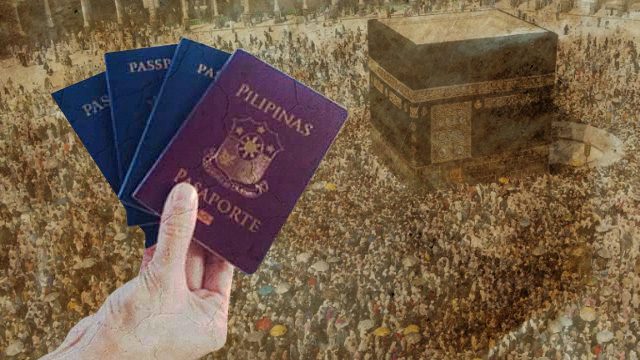SUMMARY
This is AI generated summarization, which may have errors. For context, always refer to the full article.

MANILA, Philippines – The investigation of the National Bureau of Investigation (NBI) revealed there was a “conspiracy” behind the issuance of Philippine Hajj passports to 177 Indonesians in 2016.
The Indonesians were arrested for carrying illegal Philippine passports in August 2016 at the Ninoy Aquino International Airport (NAIA) as they were bound for Saudi Arabia to perform Hajj – a required pilgrimage of Muslims to Mecca.
In a document obtained by Rappler, NBI’s Anti-Human Trafficking Division in NAIA (NBI-AHTRAD-NAIA) concluded that the main recruiters – Aziz Abdulaziz and his sister Nuruleqhwan – could not have facilitated the issuance of passports on their own without the “knowledge, approval, consent, indispensable cooperation, and participation” of officials and employees of the National Commission on Muslim Filipinos (NCMF) and the Department of Foreign Affairs (DFA).
The document, which was signed by former Deputy Director for Investigation Jose Yap and submitted to the Office of the Pasay City Prosecutor, listed at least 65 people as respondents in the complaint lodged by the NBI.
However, in a resolution released early January 2017, charges against at least 48 people were dropped due to lack of probable cause, according to a report by GMA News Online.
The Pasay City Prosecutor, meanwhile, indicted at least 10 individuals for violating Republic Act 9208 or the Anti-Trafficking in Persons Act, Philippine Immigration Act, RA 8239 or the Philippine Passport Act, and commiting estafa.
Among those charged were officials from the NCMF headed by Secretary Yasmin Busran-Lao and former DFA Passport Division employee Khalid Ali Mapandi.
Mapandi was previously the agency’s “focal person” for Hajj passports. (READ: DFA employee probed over Hajj passport scam)
Failure to follow guidelines
According to DFA Assistant Secretary Frank Cimafranca, head of the DFA’s Office of Consular Affairs (OCA), a Hajj passport is supposed to be issued to Filipino Muslim pilgrims who express a desire to perform the Hajj but do not have required documents such as a birth certificate.
It is easier to obtain a Hajj passport than a regular one as a Filipino Muslim needs to merely present a certificate of tribal affiliation from the NCMF that states he or she belongs to a certain tribe.
However, after the issue exploded, the issuance of this special document was eventually suspended.
DFA Secretary Perfecto Yasay Jr also said that Hajj passports have “really been the source of these fraudulent transactions and corruption.”
NBI’s investigation of the scam showed the existence of fraudulent transactions and perhaps oversight on the part of government agencies.
In the report, the NBI found out that the NCMF’s Bureau of Pilgrimage and Endowments (BPE) failed to follow some guidelines in place when it processed Hajj applications.
BPE personnel allegedly “admitted” that the 177 Hajj applicants under Abdulaziz did not adhere to the mandatory personal appearance requirement.
According to the guidelines for the 2016 Hajj released by the NCMF, those seeking to obtain Hajj passports were required to personally appear at any authorized issuing offices “to ensure compliance with DFA and Kingdom of Saudi Arabia requirements.” They were also required to undergo a personal interview.
They also failed to observe the allowable number for each Sheikh or religious leader. Strictly following the limited number helped the Philippines not go over its quota of 8,000 for 2016.
In addition, Abdulaziz was not initially part of the list of accredited Sheikhs for 2016. He was only included allegedly upon the request of Commissioner Abduwahid Inju, according to the NBI investigation.
The NBI also found out that the DFA’s Passport Division failed to closely examine the applications submitted to them by the NCMF.
It added that the “oversight” was because NCMF Project Evaluation Officer II Udto Bantuas used his “position, authority, and influence” to make the DFA personnel believe that the applicants were Filipinos and that the documents given were legitimate.
Exploiting ‘vulnerability’
In a report by Rappler Indonesia, Abdul Wahid Tahir of the Office of the Ministry of Religious Affairs in South Sulawesi said that exploiting unused Hajj quotas in other countries is one of the ways Indonesians bypass the waiting time of almost 37 years.
There are about 3.2 million Indonesians in the waiting list for a country which has a quota of only about 168,800. (READ: How 177 Indonesians obtained fake Philippine passports)
Their desire to perform the Hajj resulted in their paying illegal travel agencies between Rp 78 million to Rp 131 million ($5,894 to $9,900) just to get a Philippine passport.
The individuals behind the passport scam in the Philippines allegedly preyed on the vulnerability of Muslims “desirous to participate in a once in a lifetime obligation to attend Hajj.”
“They are liable for recruiting and harboring 177 Indonesians to attend the Hajj by means of fraud, deceit, and making them believe that it was legal for them to acquire, possess, and use Philippine passports,” the report said.
The Philippine government released the Indonesians back in September after they were found to be victims only. – Rappler.com
*$1 = P49
Add a comment
How does this make you feel?
There are no comments yet. Add your comment to start the conversation.